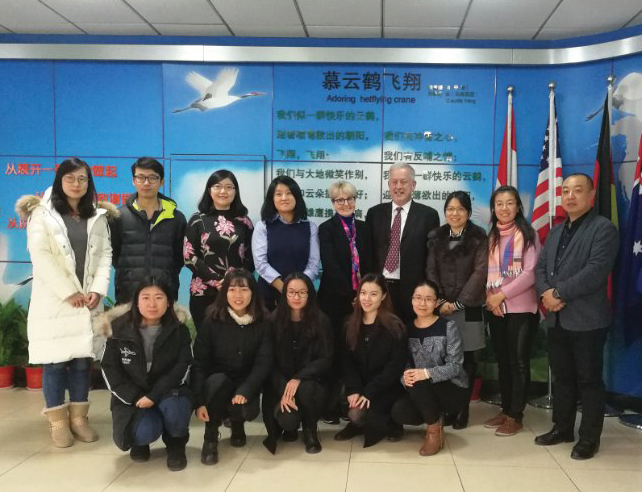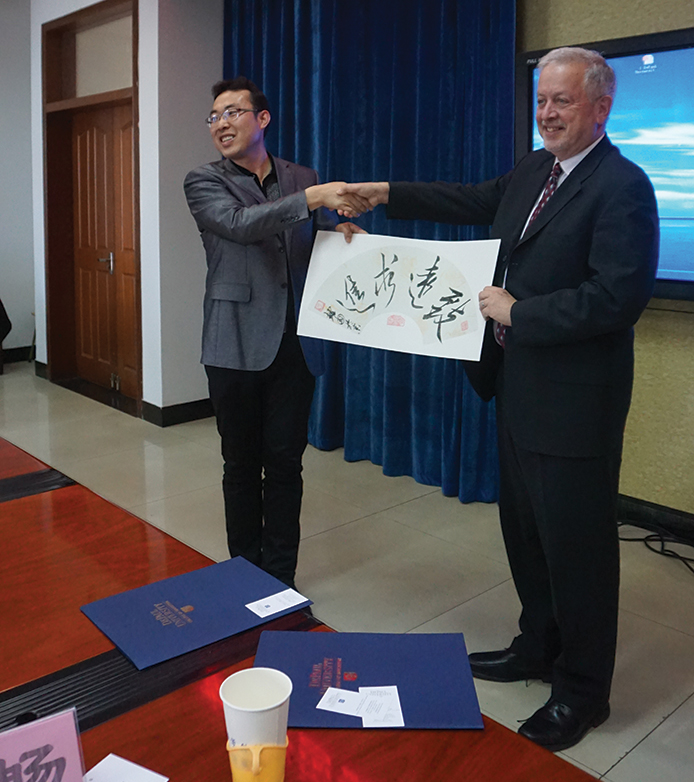“When College of Education faculty members extend their expertise to teachers in China, it not only supports DePaul’s mission, it also gives our faculty international experiences that deepen the multicultural impact of their work both in China and back here in Chicago,” says Donna Kiel, director of the Office of Innovative Professional Learning (OIPL). The professional development work Kiel oversees through OIPL now includes a significant international presence. During the past three years, OIPL has provided professional development, coaching and mentoring for close to 400 educators in China, a number that will grow this spring and summer.
 Dean Paul Zionts and Donna Kiel, director of the Office of Innovative Professional Learning, met with elementary school teachers from the Chaoyang Education District during their visit to China in December
Dean Paul Zionts and Donna Kiel, director of the Office of Innovative Professional Learning, met with elementary school teachers from the Chaoyang Education District during their visit to China in December
The government of China is deeply committed to teacher professional development and sought out OIPL to train its teachers. According to Kiel, teachers in China are subject matter experts who traditionally focus on direct instruction to large numbers of students. DePaul’s expertise and student-centered approach that engages students in critical thinking and creativity is a bold new methodology for the teachers in China and is transforming teaching and learning there.
“The partnership we have created with China is exciting and valuable for all stakeholders,” explains Dean Paul Zionts. “It provides the opportunity for our faculty to share their expertise while at the same time gaining greater understanding of the different values, points of view and practices of our partners. Ultimately, this provides a broader richness to our classrooms and the children and youth of Chicagoland.”
The college began partnering with China in 2014 when 32 Chinese instructors came to DePaul to learn about teaching science, technology, engineering and math (STEM). The next year, education faculty began traveling to Beijing to teach two-week seminars on topics such as assessment, STEM and student-centered learning.
 Dean Paul Zionts accepts a gift from the leader of the Chaoyang Education District in China.
Dean Paul Zionts accepts a gift from the leader of the Chaoyang Education District in China.
In December, Zionts and Kiel visited Beijing to talk with officials and participants and to discuss ways to expand the program. “Leaders in China found DePaul to be the most effective facilitator in improving teacher practice, while teachers found the DePaul faculty to be both knowledgeable and practical in their approach,” Zionts says. As a result, DePaul was invited to provide proposals for future workshops on 30 topics—every topic that the government was considering—including teacher evaluation, leadership best practices, student-centered learning, STEM education, interdisciplinary teaching and curriculum development.
“We were notified by the Chinese government that DePaul was awarded more opportunities to work with their educators than any other American university.” “By bringing our faculty members to China, it opens the windows of their minds to what it’s really like in the word,” continues Zionts. Kiel adds, “It’s a deeper understanding of multiculturalism, especially as it relates to the Asian population.”